- Home
- Sudhir Kakar
Death and Dying Page 2
Death and Dying Read online
Page 2
But is this conclusion valid? Is the biological evidence for the correlation of mind and brain the whole story? And does the undeniable correlation of mind and brain necessitate the conclusion that the death of the brain means the death of the person? In brief, our answer to these questions is ‘No’. The neurobiological evidence usually presented as definitive is not the whole story, and the correlation of mind and brain does not entail the conclusion that survival after death is impossible. On the other hand, the traditional religious response—that life after death is a matter of faith, not evidence—is also not the whole story. A considerable amount of empirical evidence suggestive of post-mortem survival has in fact been laboriously accumulated over the past 130 years by serious and capable scientists. In this chapter we will briefly survey that evidence (see also Braude, 2003; Gauld, 1982).
By way of introduction, we should explain that for both of us the central question guiding our careers has been that of the relationship between mind and body, but that we have come at this question from very different angles. Emily has spent her entire career investigating spontaneous experiences suggestive of survival after death, as well as studying the history of research along those lines. In contrast, Ed has addressed the question from the perspective of experimental psychology and neuroscience, particularly psychophysiological studies of altered states of consciousness. Our differing approaches, however, illustrate that a variety of methodological and conceptual tools must be brought together if we are to make meaningful headway on such enormous questions as the relationship of mind and brain, and in particular the survival of consciousness after the death of the body.
In the rest of this paper, we will present examples of some of the kinds of evidence supporting the idea of survival, evidence that is as well-attested as mainstream neurobiological evidence, but that is practically unknown to most people, scientists and religious people alike. And after reviewing this evidence, we will comment briefly on an alternative way of interpreting mind— brain correlation that is compatible with the idea of survival. Finally, we will offer a few closing thoughts on the possible ramifications of an evidence-based belief in survival.
We should first give you a brief history of the effort to find and evaluate empirical evidence for survival. The effort really began in a systematic way in 1882, when a group of British scientists and scholars, many of them based at Cambridge, organized a group called the Society for Psychical Research (SPR) (Gauld, 1968). Most of these people were dissatisfied with the often-strident proclamations of materialist scientists of the day that, as one of them, mathematician William Clifford (1874), put it, ‘There are numbers of questions relating to the connection of the mind with the body which have ceased to be open questions, because Science has had her word to say about them … [It is] a practical certainty … that there is no mind without a brain’ (p. 715). They sought to counter this confident assertion by identifying and studying phenomena suggesting that humans are more than their brains and bodies. Members of the SPR were individually interested in a wide range of phenomena, but what they all had in common was a belief that the antagonistic dichotomy between science and religion is a false one. Instead, they argued, the two can and should work together towards the common goal of understanding ourselves and our place in the universe. The methods of science that were proving so invaluable in understanding the physical world could also be applied to questions, such as survival after death, that have traditionally been the province of religion.
In attempting to forge this middle path between scientific materialism and religious faith, the early psychical researchers amassed an enormous amount of empirical data, published in books and papers amounting to hundreds of thousands of pages. 1 It is a bit simplistic, but not entirely unfounded, to say that for the first fifty years of psychical research, the emphasis was on phenomena directly suggesting survival, whereas in the next fifty or so years, the emphasis shifted away from the question of survival and instead towards experimental studies of human capacities, such as ESP or clairvoyance, that appear unexplainable by mainstream materialist science. 2 Our Division of Perceptual Studies (DOPS) at the University of Virginia has been practically alone during the modern period in keeping alive the empirical study of survival-related phenomena. 3 But in the face of the increasingly acrimonious battle in the late 20th and early 21st centuries between scientific fundamentalism 4 and religious fundamentalism, there has been renewed interest in seeking that middle ground. In particular, we are members of a group of scientists, philosophers and religious scholars, brought together under the auspices of the Center for Theory and Research at Esalen Institute in California, to try to bring together the empirical evidence for survival, mystical experiences, traditional religious beliefs about survival, and findings of modern physics and neuroscience in an enlarged understanding of mind, brain and consciousness. 5
But, as we said earlier, what we want to do in the rest of this paper is give a very quick introduction to the kinds of empirical evidence for survival that psychical researchers have been accumulating for 130 years. We have grouped this material under three major headings. First, we will present what are known as ‘crisis’ cases. These encompass a wide variety of experiences, but they all involve an experience that one person has at a time when another person, unbeknownst to the first, is undergoing some kind of crisis, usually death. Second, we will talk about experiences that occur at or near the time of death: near-death experiences (NDEs) that occur among people who are close to death but recover, or the visions and experiences of people who soon afterwards do die. Finally, we will talk about experiences that occur in connection with certain highly unusual individuals, specifically cases involving mediums and cases involving young children who seem to be remembering a previous life.
One extremely important point to keep in mind, however: For the one or two examples that we will give for each type of case, there are scores, hundreds, sometimes even thousands more, reported in the literature of psychical research, usually equally as good. Moreover, most of these cases are emphatically not mere hearsay anecdotes, but are first-hand accounts that often have been painstakingly investigated and documented by an outside observer. The case for or against survival therefore does not rest on a few isolated incidents, or even on one particular line of research, and if one is to take a position on this matter, it must be based on the whole accumulated body of material available for study, and not just a few isolated examples.
Crisis Cases
We begin with crisis cases, in which a person may see an actual apparition, hear a voice, have a dream or a waking intuition, or simply feel the presence of another person at about the time that person is dying some distance away. The first example is typical, and was reported in an online survey conducted by Emily several years ago:
My father died of [a heart attack] when I was ten years old. This was quite unexpected … He was forty-two years old. I told my teacher that my father had died and shortly thereafter, a close friend of my mother arrived [at school] to pick me up.
This experience involved no visual or other sensory experience, but was apparently a sudden intuition that something specific had happened. Such experiences also often happen in a dream or when the person is in some other kind of altered state:
I had a dream that my grandmother was calling me from her room. The next thing I knew I was talking to her about her taking a trip. In the morning or sometime that afternoon I learned she had died the night before. I wasn’t surprised or shocked; it was as if she had already told me she was going.
Many other experiences occur during the borderline state between waking and sleeping. The next case may have been one of those, although, as with many cases, it is not entirely clear whether the person was awake, asleep or in between. It was reported by a man who had been very close to his cousin, Bob:
I was in bed one night, and I’m not sure whether I dreamt this or just what happened,
but I could definitely hear [Bob] knocking on my window and on my door and asking to be let in, and telling me he needed help. It was just so realistic that I actually got up out of bed and went to the front door to see if he was there. Nobody was there, of course, and I went back to bed, and I heard it again. Needless to say, I didn’t sleep much more that night … I got up at my usual time and went to my shop and shortly after I got into my shop, my phone rang, and it was Bob’s sister’s son calling to tell me that he [had] committed suicide during the night.
One interesting point about this case is that the man had told his wife what happened before they learned about Bob’s death. They both had woken up in the night. She didn’t hear anything, but he told her what he had experienced, and she confirmed that he had told her this. That kind of corroboration is important, and the 19th-century psychical researchers had emphasized interviewing people and getting such corroboration whenever possible. 6 Getting corroboration is not meant to imply disbelief in what the person says, but it is helpful to have when confronted with scoffers, who, not infrequently, say, ‘Oh, he later believed that he had this dream the night of the death, but he really didn’t. It happened the next night, when he was upset.’ Corroboration from a second person helps deflate this kind of response.
In the next case, the person clearly was awake:
I saw my grandfather walking down the hall of my house, which is 1200 miles [away] from his in Kentucky. He died of a massive coronary. When I saw him, he was almost opaque in appearance, as if you were viewing a hologram. I received a phone call two days later that he had passed. The time I saw him almost precisely coincides with the time of his death, [but] I was not told of his death for two days. I was extremely close to him, and the family, frankly, was trying to figure out which one of them should tell me.
As he said, this man was ‘extremely close’ to his grandfather. With such an emotional bond, it might not seem too surprising that he would have such an experience at the time that his grandfather died. But there are other situations when it is puzzling why the experience happened to the person that it did:
When I was eighteen years old and still living at my parents’ … I was awakened at 1 a.m. I opened my eyes and saw my boyfriend’s brother-in-law standing at the foot of my bed. I don’t know why, but I felt scared. I looked into his eyes and screamed. My parents ran into my room, turned on the light and sat on my bed. I told them what happened, and they said it was a dream, so go back to bed. Just as they were walking out of my room, the telephone rang. My mom answered the phone, and said it was my boyfriend; he apologized to her for calling that late, but just wanted to tell us that his sister found her husband dead in their apartment when she arrived home from work around 11 that night.
There did not seem to be a close emotional bond here. Why didn’t the experience happen to the man’s wife, or even his brother-in-law? Is it that the percipient is a particularly receptive person in some unknown way? Or is there some other factor, or combination of factors? The more experiences that we learn about, the more we realize that we really understand very little about why, when and to whom they happen.
Another kind of crisis case involves an unusual physical event happening at the time of a death.
A year and a half ago, my mother-in-law passed on unexpectedly. The night she died, my husband, two children and myself were sitting on the couch, watching a movie. All of a sudden I felt a cold breeze, like someone cold walked past quickly towards the kitchen, and then the picture of the Last Supper, which was a gift from my mother-in-law, fell off the wall in the kitchen. We all felt the cold, but my husband said it was just a breeze and the windows are drafty. He said the picture falling was a coincidence. That night at 3 a.m., his sister called us, crying, saying their mom had died of a heart attack.
Objects moving and cold breezes are relatively frequently reported, but other experiences are much more unusual:
The day my Grandma died I was headed out to work about 3 a.m. I knew she was very sick, and I had planned to fly to New Jersey later that day to see her because I knew time was short. As I went to put the key in the car, I felt this overwhelming presence, and all of a sudden my driver-window shattered, and I thought to myself, Grandma just died. As I got to work, I could not shake the feeling of Grandma right next to me. The phone call came; Grandma had died at the same time I felt her and the window shattered. I felt this was Grandma’s way of telling me she is gone.
How often does a driver-side car-window spontaneously shatter? It may happen occasionally when it is 40 degrees below zero in Maine. But this woman was in Florida. Clearly, we need a better explanation than chance coincidence, the fallback position of scoffers.
Psychical researchers have placed great emphasis on these crisis cases, primarily because they cannot be explained simply as subjective hallucinations resulting from shock, grief or expectation. The percipient did not yet know about the death, and therefore was not in a state of shock, grief or expectation. For many people, therefore, crisis cases are what they seem to be—a kind of communication from the deceased person, as if the person had come to announce his or her death. Other people, however, have countered, ‘Wait, not so fast. We have a growing body of evidence, experimental and experiential, of telepathy, clairvoyance, precognition, and so on. Maybe such abilities among living people can adequately account for the experience.’ The debate between these rival interpretations— survival vs ‘superpsi’—has been going on since the early days of the SPR, not only in connection with crisis apparitions, but with all types of survival-related evidence.
The interpretation of these cases is further complicated by the fact that numerous similar experiences occur after the person’s death, when the percipient did know about the death. In such situations, a grief-or hope-induced hallucination might make sense. Nonetheless, because post-death experiences are so phenomenologically similar to crisis cases, perhaps we should not be too hasty in dismissing them simply as imagination, and should look more seriously at the idea that the same process is going on in both situations.
Consider some of these examples:
I saw an older lady looking at my newborn daughter in her crib when I got up to use the bathroom. It was my grandmother who passed away while I was pregnant.
This might have been a hallucination resulting from the granddaughter’s grief because her grandmother hadn’t lived long enough to see the baby. But it is worth considering also the possibility that the great-grandmother wanted to see her new great-grandchild.
In this case, the woman actually saw her grandmother. In other cases, there is just a strong sense of presence, which people often find hard to describe. There is no sensory component to it, just a sense that someone—even a particular someone—is there at a particular point in space. One conjecture by some of the early psychical researchers was that the sense of presence may be just the beginning stage, an incipient apparition that does not develop far enough to become an actual, full-blown sensory experience. Here is an example:
I was simply driving home one evening when I had the distinct feeling that my deceased father was in the car with me. It wasn’t a creepy feeling, like a ghost was there; it was just a very real feeling like he was still alive and riding in my passenger’s seat … just like we were going out to pick up a pizza or something. I KNEW it couldn’t be real, but I had to fight myself not to turn my head and look to see if he was actually sitting there. I could sense that he was laughing about something too, and I wondered if he was a spirit being who could read my thoughts and [was] amused by my unbelief.
Related to experiences of a sense of presence, but taking on a sensory aspect, are smells. Many people have reported some smell that they associated with the deceased person, such as a familiar aftershave, cologne, cigar, whiskey or flowers. Particularly important are cases in which more than one person smells it, suggesting that something more objective than a hallucination is going on.
My mot
her-in law passed on in ‘99. After she had died, my husband and I had returned home. As we walked up the walkway to our front door, there was a sudden burst of fragrance. Very overwhelming and strong. My husband and I looked at each other, and both commented that it smelled like his mother’s cologne. It seemed to come out of nowhere and was very strong for about 10–20 seconds, then it was gone.
We mentioned earlier that some crisis experiences involve physical events, such as the case with the shattering of the car window. There are similar experiences among non-crisis cases. Here is one that also involved glass, although in this case the glass did not break:
A friend of mine and I were talking about my deceased son … when all at once four glasses, hanging on hooks under the cabinet, started to move. They moved so hard I thought they would break. After five minutes they stopped moving. When my daughter came over that evening, I was telling her about it, and they started moving and hitting against one another all over again … Those glasses have moved for no reason several times when we discuss my deceased son.
For many people, apparitional-like experiences, whether crisis or not, suggest that the deceased person is trying to communicate something to the living person, even if just the simple message in crisis cases that ‘I have died’, or in non-crisis cases that ‘I am here.’ In some cases the message has been much more specific. In one case (Sidgwick, 1885, pp. 95–98) a Mr D had a very vivid, realistic dream in which Robert Mackenzie, an employee of his whom he had not seen in many years, appeared in an agitated state and said that he wished Mr D to know that he, Robert, did not do what he was being accused of doing. With the next post came a letter reporting that Mr D’s employee had committed suicide at a company party the previous Friday. It subsequently turned out that Robert had not committed suicide, but had accidentally drunk the poison that killed him. Mr D believed that Robert, immensely grateful to Mr D for employing and helping him, wished to correct the accusation because of ‘his earnest desire to stand well in my opinion’.

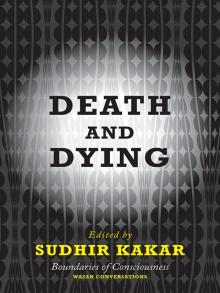 Death and Dying
Death and Dying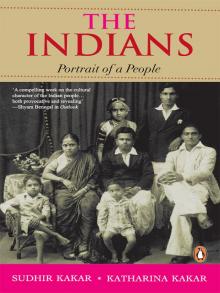 The Indians
The Indians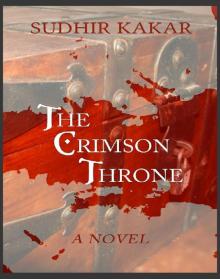 The Crimson Throne
The Crimson Throne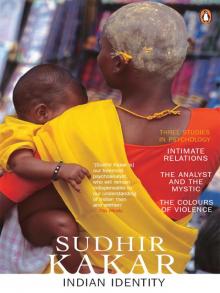 Indian Identity
Indian Identity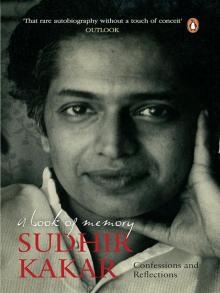 A Book of Memory
A Book of Memory